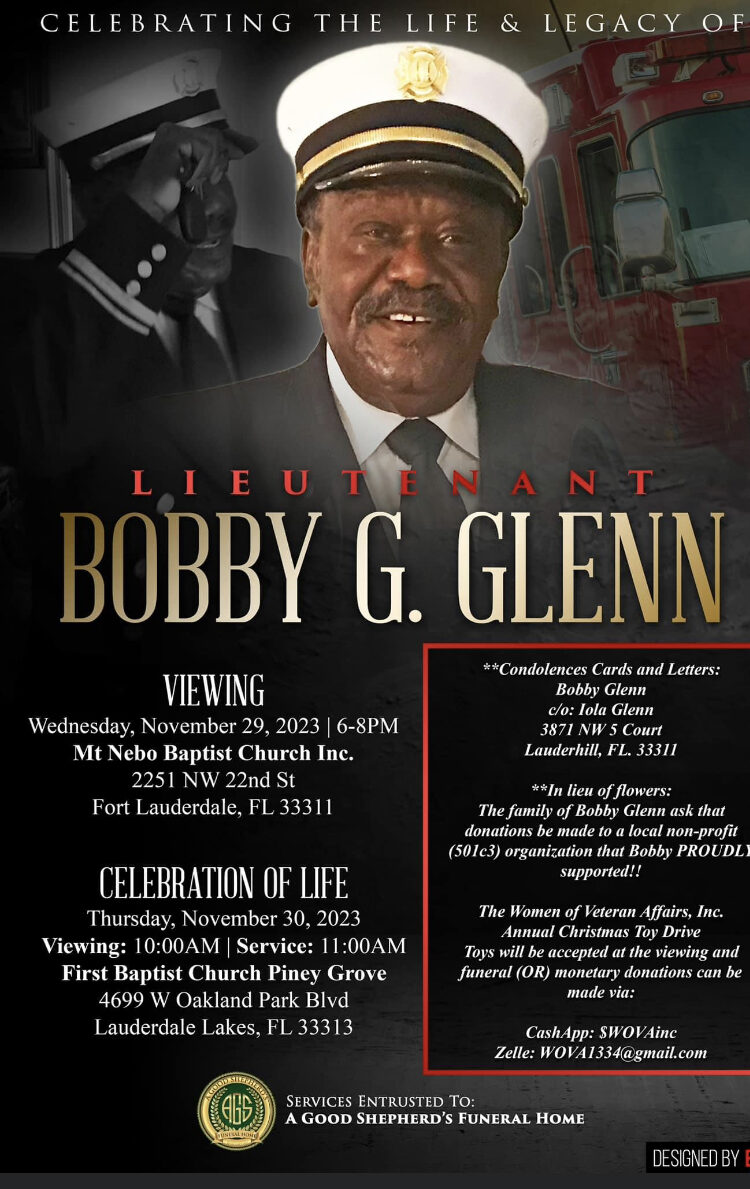 By Sylvester ‘Nunnie’ Robinson
By Sylvester ‘Nunnie’ Robinson
I first came to Broward County in 1969, an inexperienced first year teacher, who like so many others, had been recruited by Mrs. Blanche G. Ely to help continue the educational legacy she and her husband had established to enrich the lives of the students in the Pompano Beach community. One of the individuals that I met early on was the iconic Mr. Robert “ Bobby “ Glenn, a product of the community that Mrs. Ely had poured her professional career into. I’m not certain that anyone individual, not intrinsically involved in the challenge, can appreciate the intrepid fortitude, perseverance and determination needed in the late sixties and early seventies to withstand the racial epithets, taunts, naysayers, and obstacles confronting anyone daring enough to break barriers, thus forging opportunities for young African Americans that he would never know personally.
I speak proudly of my fraternity brother Bobby Glenn, who pledged Omega Psi Phi, Fraternity, Inc. at Upsilon Psi Chapter at Florida Agricultural and Mechanical University(FAMU)in 1961. When he came back to Fort Lauderdale, he joined the Zeta Chi Chapter. He was Fort Lauderdale and Broward County’s first, absolutely and emphatically, Black firefighter who retired in 1992 after 22 years of service. He stated of his travails, “They didn’t have any Blacks and didn’t have any females on the department. It was kind of an uphill grind. It wasn’t an easy task at that time.”
“Lieutenant Bobby Glenn understood the importance of uniting the Black Firefighters in Broward County. He was a founding member of the Liberal Black Firefighters of Broward County, which is under the umbrella of the International Association of Black Professional Firefighters. Being ‘THE FIRST’ he understood the deleterious conditions and dealt with racialism at the fire house every shift. Uniting the Black Firefighters gave them an organization to which they could discuss the injustices endured and possibly get some help to right the wrongs.” “All I am I owe.”– Debra Flowers, City of Fort Lauderdale / Fire Rescue
A beneficiary of this iconic trailblazer is retired firefighter Michael “Truck” Peavy who said of his hero, “ This is probably one of the hardest things I’ve had to do. This is in honor of my friend Mr. Bobby Glenn, who was not only the first Black firefighter, instrumental in my ascension in the profession -alluding to the light blue Liberal Black Firefighters shirt he adorned along with a Fort Valley State University cap – he was also a great track star who set numerous records competing against Bob Hayes while at FVSU.”
Michael “Truck” Peavy fondly recalled Bobby saying that he used to always tell people, “I found him out at Sunland Park sitting in front of the pool and I gave him a job.” A sense of humor he definitely had.
Retired Broward County Fireman Ralph Rachel, referred to Bobby Glenn’s passing as “The Empty Void” stating, “As we prepare to celebrate the life of Lieutenant Bobby Glenn, The First Black Firefighter for the City of Fort Lauderdale, and founding President of the Liberal Black Firefighters Association, let us not forget the challenge it will be to fill the void of his passing.
Bobby’s work reflects the courage needed to confront the wrongs committed to himself and other facings issues in the fire service. His success and progress in the department reminded Fire Chiefs and City Leaders that there was a shortage of black firefighters across their departments.
Bobby’s hard work, dedication, and adaptability paved the way for the upward mobility from Firefighter to Driver Engineer, and ultimately Chief Officers, which were positions in the fire service that were excluded from Black Firefighters. Lieutenant Glenn realized that unity was our best strategy along with wisdom and courage as the key tools of the trade. His ability to interact with others, collaborate on shared points of views, and make decisions for the best interests of all enhanced his position as a leader.
Critical issues in the fire and Emergency Services continue to offer insight into old and continuing problems will continue to grow, however, because we know that the courage that Bobby shared lives within us all, we can succeed by all strides. His legacy will never be forgotten and it will stand as strong as his faith in who he was as a Leader in the Fire Service..”
Before Lieutenant Glenn finished his last services here, his family and friends joined first responders to give a hero’s welcome — and a heartfelt sendoff — to a true South Florida trailblazer. A grateful community held a celebration on Saturday for Bobby Glenn.
“Super excited and proud just to be here and have him here and everyone here to represent him,” said Jasmine Lawson, Glenn’s granddaughter who followed in her grandfather’s footsteps as a firefighter with the City of Lauderhill.
“He inspired me to become a firefighter.”

